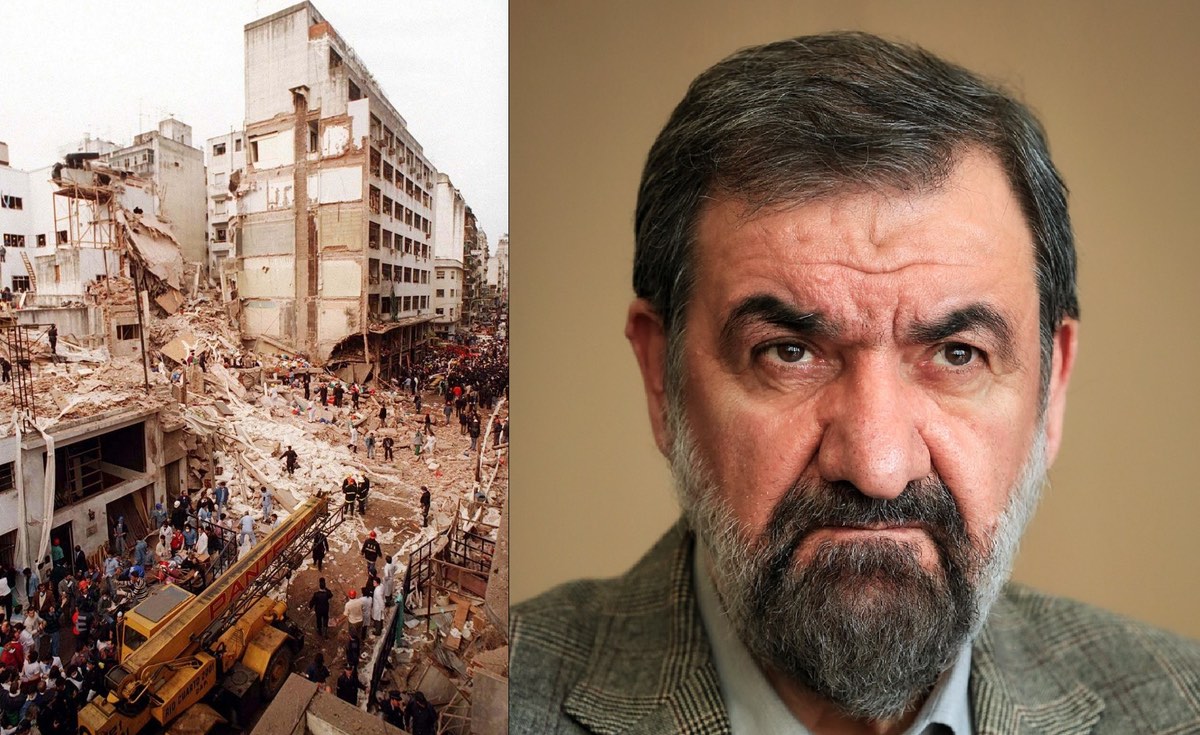Jewish leaders in Argentina have expressed fury at the presence in Nicaragua of a leading Iranian official wanted for the 1994 bombing of the AMIA Jewish center in Buenos Aires, at the same time accusing the Argentine foreign ministry of doing nothing to secure his detention under the terms of an outstanding international arrest notice.
Iranian Vice-President Mohsen Rezaei was among the guests at Monday’s presidential inauguration in Managua of Nicaragua’s authoritarian leader, Daniel Ortega, who won a fourth term in office last November in an election marred by suppression of opposition parties and allegations of voter fraud.
A former commander of the regime’s Islamic Revolutionary Guards Corps (IRGC), Rezaei was one of six Iranian operatives who were the subjects of “Red Notices” originally issued in 2007 by Interpol, the international law enforcement agency, for their roles in the bombing of the AMIA center in downtown Buenos Aires. Eighty-five people lost their lives and more than 300 were wounded when a truck packed with explosives rammed into the AMIA building on July 18, 1994.
Despite his status as a fugitive from international justice, Rezaei was feted in Managua during meetings with both Ortega and Cuban President Miguel Díaz-Canel. But while Argentina’s foreign ministry issued a statement condemning Rezaei’s presence as “an affront to Argentine justice and to the victims of the brutal terrorist attack,” Argentina’s main Jewish community organization excoriated Daniel Capitanich, the Argentine Ambassador to Nicaragua, for attending Ortega’s inauguration nonetheless.
A letter on Tuesday to Argentine Foreign Minister Santiago Cafiero from the leaders of DAIA, the community’s umbrella organization, expressed “absolute condemnation of the conduct of the ambassador of our country in Nicaragua, Daniel Capitanich.”
The letter stated that “not only did the Argentine Foreign Ministry not file any complaint or request the Nicaraguan government to activate the mechanisms for Interpol to proceed with the arrest of Rezaei, but the Argentine Ambassador attended [Ortega’s inauguration] and did not even comment.”
Although there have been no less than four distinct judicial trials arising from the AMIA atrocity, none of the Iranian officials wanted in connection with the bombing has ever been detained. In addition to Rezaei, four other Iranians remain the subjects of the “Red Notices” that were issued by Interpol as a result of the efforts of Alberto Nisman — the Argentine federal prosecutor whose revelations about the Argentine government’s collusion with Iran in the years that followed the AMIA bombing are widely believed to have led to his assassination in Jan. 2015.
The sixth “Red Notice” subject, the Hezbollah terrorist Imad Mughniyeh, was meanwhile killed in a 2008 car bombing in Syria.
Toby Dershowitz — a senior vice president with the Foundation for the Defense of Democracies (FDD), a Washington, DC,-based think-tank — told The Algemeiner that Rezaei’s arrival in Managua proved that Iran was toying with the international community’s resolve.
“Iran is testing the west. It’s a test we shouldn’t fail,” Dershowitz said. “Should the world look the other way, not only will justice not be served but it will, in effect, give license to Iran’s leaders to continue to engage in its nefarious, often deadly acts of terrorism. The choice is whether to give in to Iran’s intimidation or end the era of impunity.”
At the time of the AMIA bombing, Rezaei was the commander of the IRGC. In 1993, one year before the bombing was carried out, Rezaei was reported to have attended a meeting in the Iranian city of Mashhad where the decision to attack the AMIA building was discussed and approved.
Also present at the Mashhad meeting was Ali Akbar Velayati, the Iranian foreign minister at the time of AMIA bombing who is now a senior adviser to the regime’s “supreme leader,” Ayatollah Ali Khamenei. Velayati, who remains the subject of an arrest warrant issued by an Argentine judge in 2006, courted legal controversy during a visit to Moscow in July 2018, when he met with Russian President Vladimir Putin. At the time, Argentina’s government accused the Kremlin of “bureaucratic evasions” after a formal request for Velayati’s arrest was summarily ignored.
1st published by The Algemeiner

